Netskope Threat Labs publishes a monthly summary blog post of the top threats we are tracking on the Netskope platform. The purpose of this post is to provide strategic, actionable intelligence on active threats against enterprise users worldwide.
Summary
- Attackers continue to attempt to fly under the radar by using cloud apps to deliver malware, with 60% of all malware downloads in May originating from a record 177 cloud apps.
- While malicious PE (EXE/DLL) files are still the most common malware file type, malicious PDF files rose to become the second most common, with a rise in malicious PDFs downloaded from free hosting services Squarespace and Weebly and document sharing service DocPlayer, among other sources.
- The Rhysida ransomware emerged in May, claiming to be doing their victims a favor by compromising their systems and demanding a ransom payment.
Cloud Malware Delivery
Attackers attempt to fly under the radar by delivering malicious content via popular cloud apps. Abusing cloud apps for malware delivery enables attackers to evade security controls that rely primarily on domain block lists and URL filtering, or that do not inspect cloud traffic. In May 2023, 60% of all HTTP/HTTPS malware downloads originated from popular cloud apps, nearing the all-time high we saw in February.
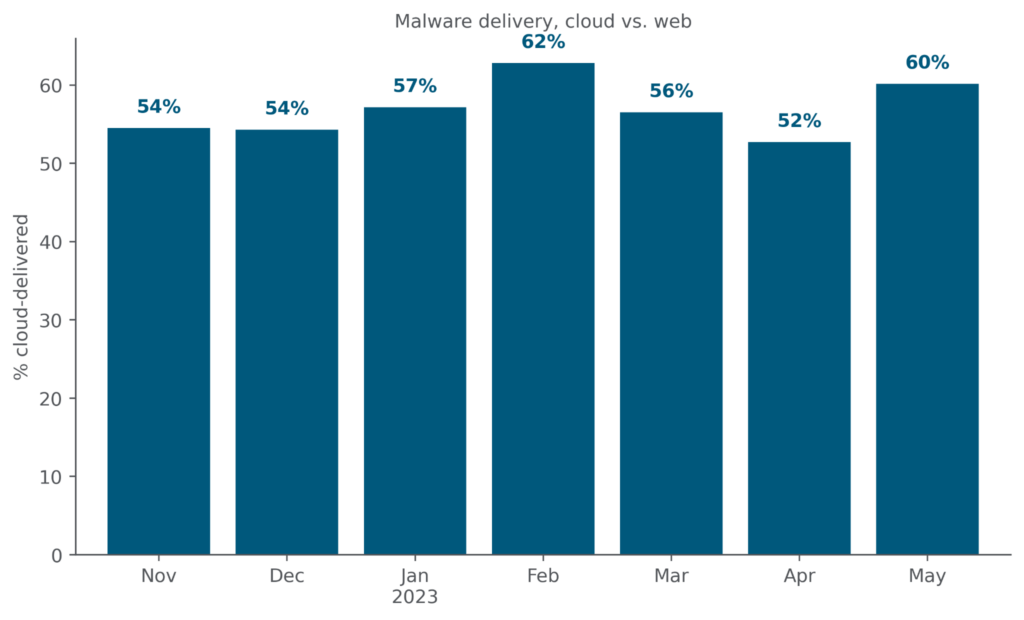
The number of cloud apps from which the downloads originated also increased, reaching a new monthly record of 177 apps, beating the February record by more than 20 apps.
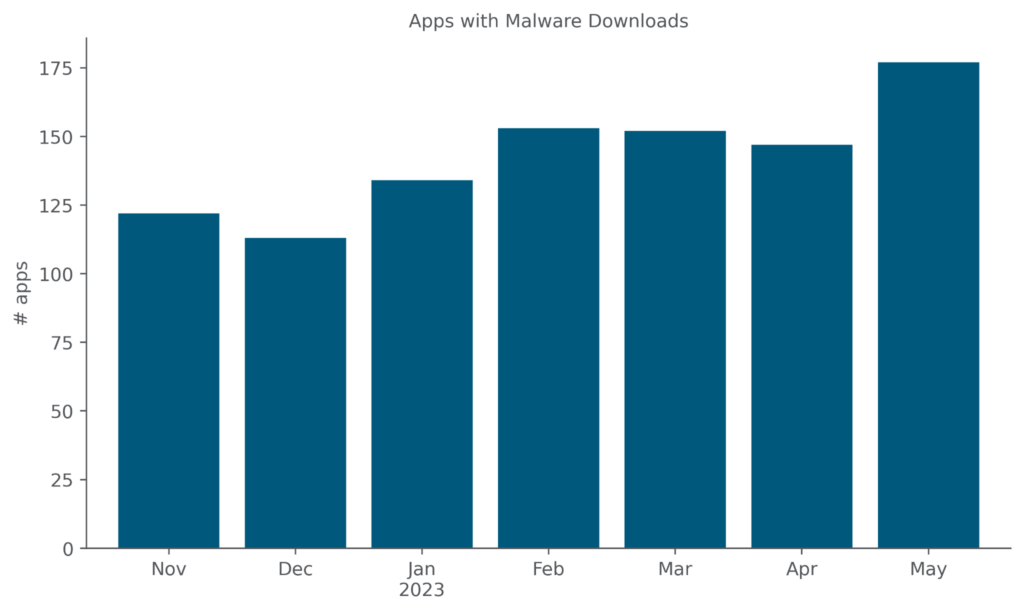
Attackers achieve the most success reaching enterprise users when they abuse cloud apps that are already popular in the enterprise. Microsoft OneDrive, the most popular enterprise cloud app, has held the top spot for the most cloud malware downloads for more than six months. Although the percentage of cloud downloads from OneDrive have fallen for the second consecutive month, it still remains in first by a large margin. Other top apps for malware downloads include free web hosting services (Squarespace and Weebly), collaboration apps (Sharepoint), free software hosting sites (GitHub), cloud storage apps (Azure Blob Storage, Box, Google Drive), and webmail apps (Outlook.com). DocPlayer, a free document sharing app, made the top ten for the second consecutive months as malicious PDF files have increased in popularity. The top ten list is a reflection of attacker tactics, user behavior, and company policy.
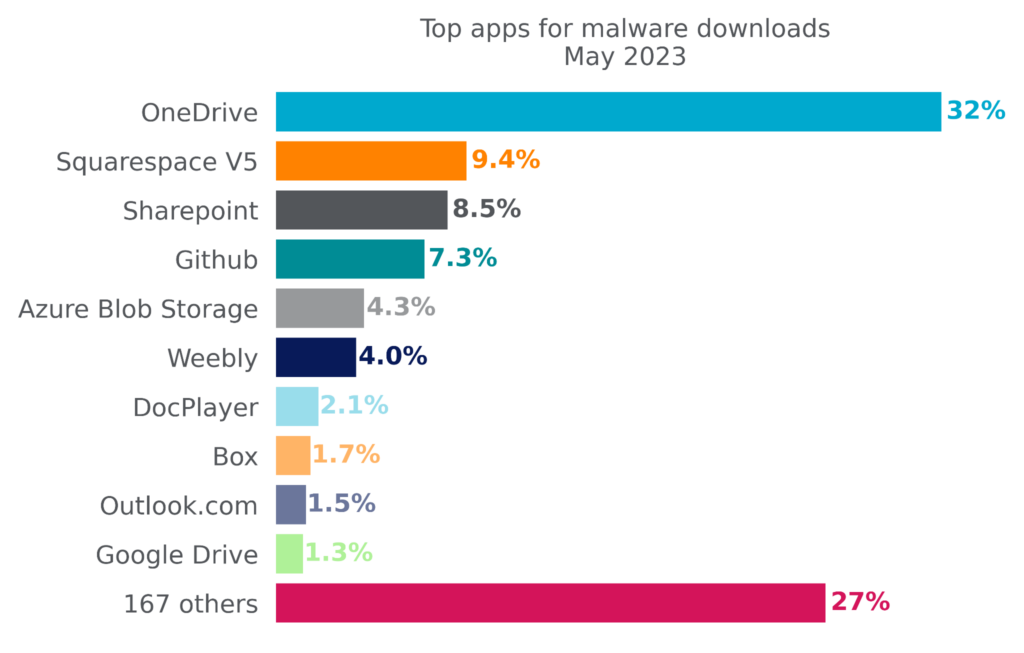
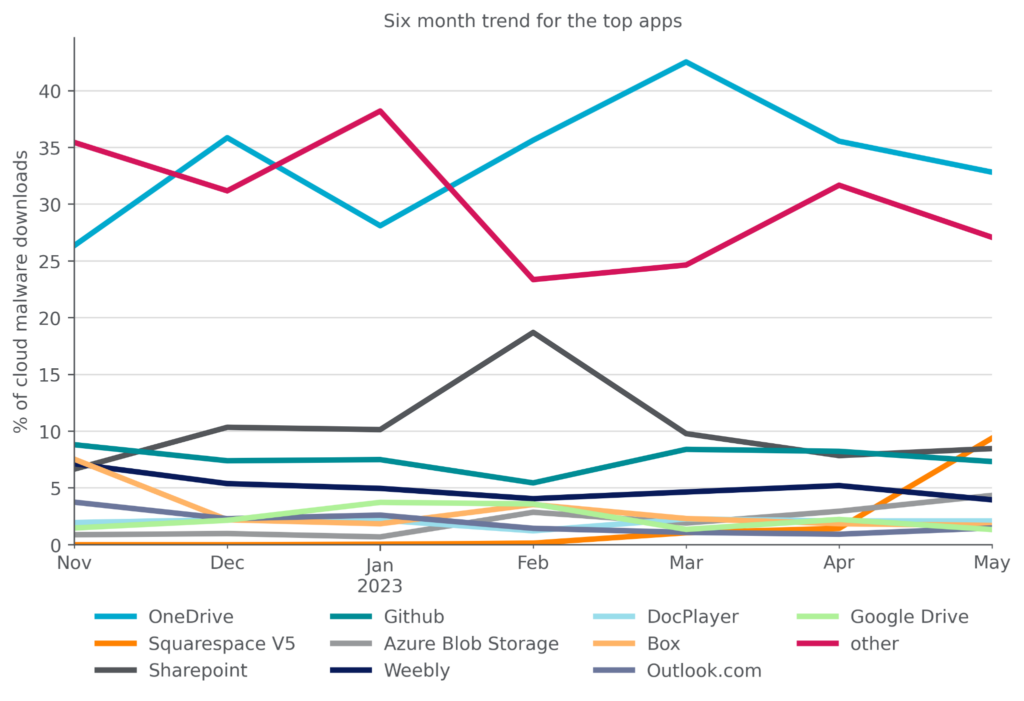
Top Malware File Types
By file type, Microsoft Windows Portable Executable files (EXE/DLL) accounted for the plurality of malware downloads in May, as they have for at least the past six months. Rising to second place for the first time in six months were PDF files, just barely beating out ZIP archives, which were followed closely by plain text files, including PowerShell scripts and LNK files. Archive formats RAR and GZip, Microsoft Office file formats, and Mac DMG files rounded out the rest of the top ten. Mac DMG files have now made the top ten for three consecutive months as attackers continue to target OSX users.
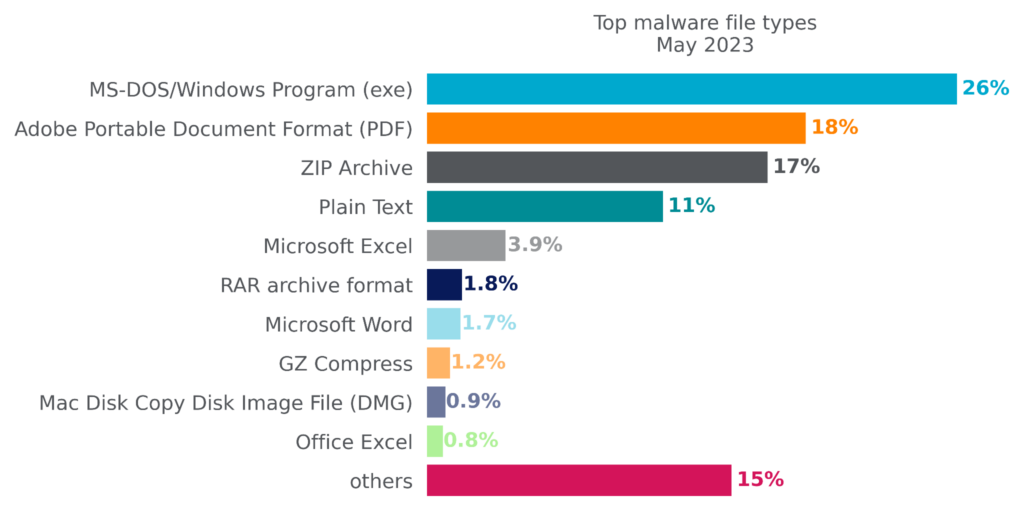
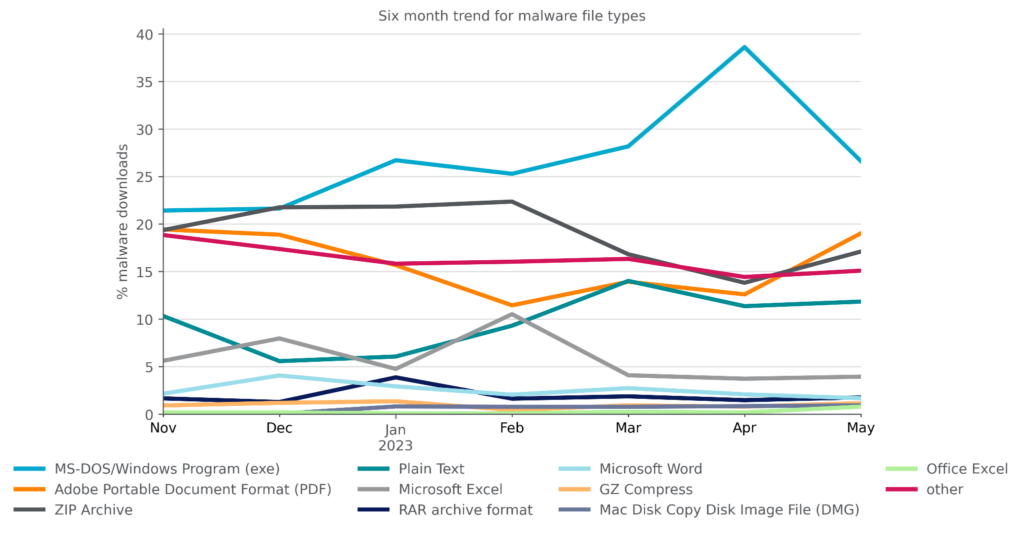
Top Malware Families
Attackers are constantly creating new malware families and new variants of existing families, either as an attempt to bypass security solutions or to update their malware’s capabilities. In May 2023, 65% of all malware downloads detected by Netskope were either new families or new variants that had not been observed in the preceding six months. The other 35% were samples that had been previously observed during the preceding six months and are still circulating in the wild.
By volume, Netskope blocks more Trojans than any other malware type. Trojans are commonly used by attackers to gain an initial foothold and to deliver other types of malware, such as infostealers, Remote Access Trojans (RATs), backdoors, and ransomware. Other top malware types include phishing lures (typically PDF files designed to lure victims into phishing scams), viruses (which can propagate themselves), downloaders (which download additional malicious payloads), and file-based exploits.
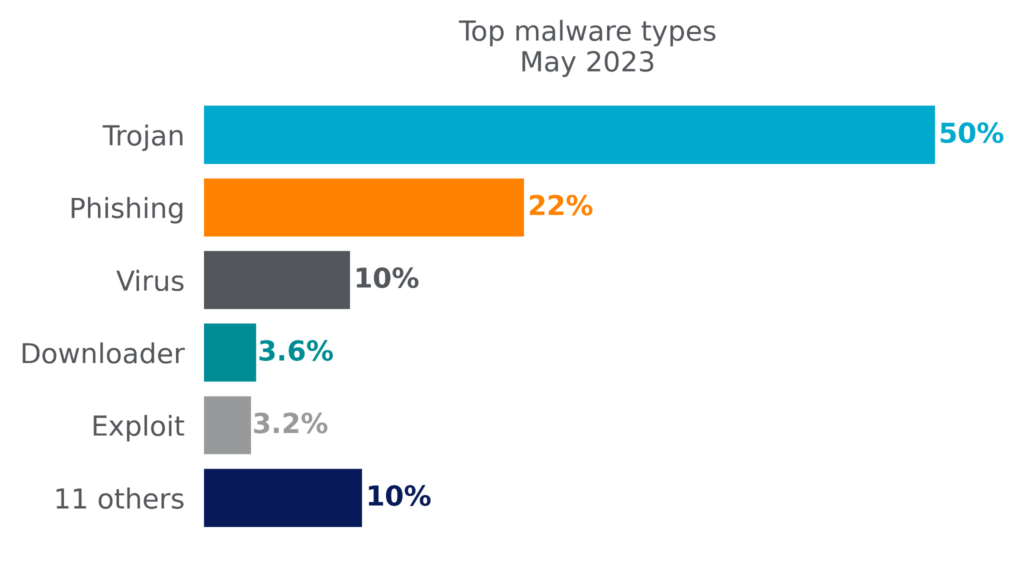
The following list contains the top malware and ransomware families blocked by Netskope in May 2023:
- Backdoor.Zusy (a.k.a. TinyBanker) is a banking Trojan based on the source code of Zeus, aiming to steal personal information via code injection into websites. Details
- Downloader.SLoad (a.k.a Starslord) is a download that is often used to deliver Ramnit. Details
- Infostealer.AgentTesla is a .NET-based Remote Access Trojan with many capabilities, such as stealing browsers’ passwords, capturing keystrokes, clipboard, etc. Details
- Infostealer.ClipBanker is a banking Trojan and information stealer that is typically spread through phishing emails and social media. Details
- Phishing.PhishingX is a malicious PDF file used as part of a phishing campaign to redirect victims to a phishing page.
- Ransomware.Rhysida first emerged in May 2023 and is a group that positions themselves as helping their targets by highlighting security issues, but still demands ransom payment. Details
- Trojan.AmsiBypass is a malicious PowerShell script that attempts to bypass the Windows Antimalware Scan Interface (AMSI). Details
- Trojan.Razy is a Trojan typically distributed via malicious ads disguised as legitimate software, often used to steal cryptocurrency data. Details
- Trojan.Valyria (a.k.a. POWERSTATS) is a family of malicious Microsoft Office Documents that contain embedded malicious VBScripts usually to deliver other malicious payloads. Details
- Virus.Sality is a Russian P2P botnet that has been around since 2003 and is used to deliver a variety of different malware payloads, steal cryptocurrency, and provide attackers remote access. Details
Recommendations
Attackers have always sought to evade detection and avoid suspicion in delivering malware. Two strategies that attackers have been using increasingly in the past six months are to deliver malware by abusing cloud apps and to package malware in archive files. Netskope Threat Labs recommends that you review your security posture to ensure that you are adequately protected against both of these trends:
- Inspect all HTTP and HTTPS downloads, including all web and cloud traffic, to prevent malware from infiltrating your network. Netskope customers can configure their Netskope NG-SWG with a Threat Protection policy that applies to downloads from all categories and applies to all file types.
- Ensure that your security controls recursively inspect the content of popular archive files such as ZIP files for malicious content. Netskope Advanced Threat Protection recursively inspects the content of archives, including ISO, TAR, RAR, 7Z, and ZIP.
- Ensure that high-risk file types like executables and archives are thoroughly inspected using a combination of static and dynamic analysis before being downloaded. Netskope Advanced Threat Protection customers can use a Patient Zero Prevention Policy to hold downloads until they have been fully inspected.
- Configure policies to block downloads from apps that are not used in your organization to reduce your risk surface to only those apps and instances that are necessary for the business.
- Block downloads of all risky file types from newly registered domains and newly observed domains.
In addition to the recommendations above, Remote Browser Isolation (RBI) technology can provide additional protection when there is a need to visit websites that fall in categories that present higher risk, like Newly Observed and Newly Registered Domains.
About This Report
Netskope provides threat and data protection to millions of users worldwide. Information presented in this report is based on anonymized usage data collected by the Netskope Security Cloud platform relating to a subset of Netskope customers with prior authorization. This report contains information about detections raised by Netskope’s Next Generation Secure Web Gateway (SWG), not considering the significance of the impact of each individual threat. Stats in this report are based on the period starting November 1, 2022 through May 31, 2023. Stats are reflection of attacker tactics, user behavior, and organization policy.




 Voltar
Voltar
















 Leia o Blog
Leia o Blog